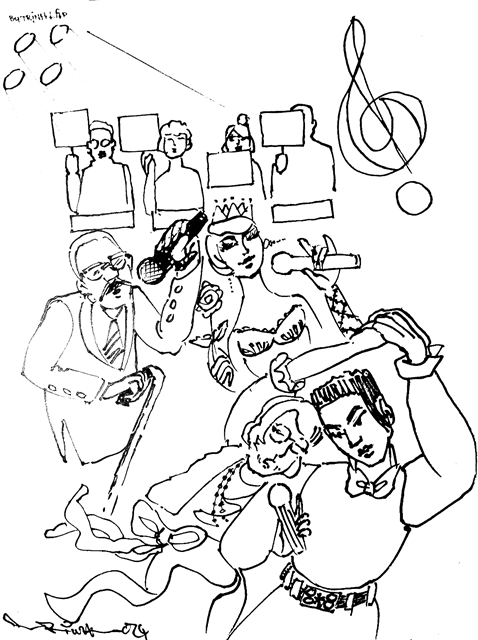The new words that shed light on how the youth love today

Illustration by Trịnh Lập
By Mỹ Hà
This holiday season may be a time for family reunions, but beyond preparing for gatherings or browsing the internet for news and entertainment, older internet users have a new challenge: deciphering the language of Gen Z to understand what the younger generation is saying.
"The concert ended over a month ago," writes a young fan of a TV entertainment series, "but I still 'lụy' the singers who performed in it."
People over 40 rarely use this word, especially in public. If you're a foreign student learning Vietnamese, chances are you'll never encounter such terms. Textbooks won’t include them, and even teachers might not fully grasp their nuanced meanings.
As native Vietnamese speakers, we often feel alienated from our evolving culture and vocabulary. The initial confusion gives way to curiosity. We want to learn these novel expressions to keep up with young people as they create an ever-changing world of words.
Of course, not all new words gain traction or stand the test of time. But some do, and perhaps one day, they will be included in the latest Vietnamese dictionary.
The word "lụy", as a verb in the dictionary, refers to depending on someone’s mercy or abiding by the will of someone powerful. It can also describe being negatively affected by an incident. Interestingly, this word is traditionally used to describe the death of whales.
As a noun, "lụy" can also be misspelt to mean "tears". However, its most popular modern meaning is to fall desperately in love. This is often unrequited and evokes the image of someone sinking into a deep emotional hole, unable to escape.
"I feel so 'lụy' for these guys; I watch their videos almost every day and cry," reads a comment that mirrors many others, all expressing the same sentiment with slightly different wording.
This kind of public, unfiltered emotional attachment to music idols feels new and strange to us. We’ve had our role models, but their collective influence never reached this intensity. It’s enough to raise an eyebrow—or two.
When fans feel "lụy" for their idols, they might also feel "suy" when they can’t secure tickets to a live performance. "Suy" traditionally means a decline—in mental state, health, or status. Medically, it denotes organ failure or overall health deterioration. In social contexts, it refers to economic or moral decline.
Today, "suy" has gained popularity for describing heartbreak or sadness. It’s not just about unrequited love; it signifies a prolonged mental state that can push someone to the brink of emotional collapse.
The word became a social media phenomenon thanks to rapper MCK (Nger), whose song Suy features the catchy phrase in its lyrics: "Baby, don’t make me 'suy'." It’s a direct plea: "Don’t break my heart."
Another rapper also popularised "suy" by exploring themes of broken hearts and deep sorrow in his music.
On the flip side, "sĩ" represents pride—specifically, the fans’ pride when their idols release a new song or deliver an exceptional performance. This sense of pride can sometimes spark competitive behaviour among fan groups, leading to comparisons that fuel online feuds. Such "cyber wars" rarely yield anything positive or meaningful.
As we scroll through social media, we’re often bewildered by the novel vocabulary and expressions. Words we thought we understood now carry entirely different meanings.
So, kids, beware: although we’re on the "suy" side of life, our hearts and souls aren’t completely out of sync. We can still "sĩ" about you—the idols of not only the youth but also those of us over 50—as we "lụy" over your songs and performances for a long time to come. VNS